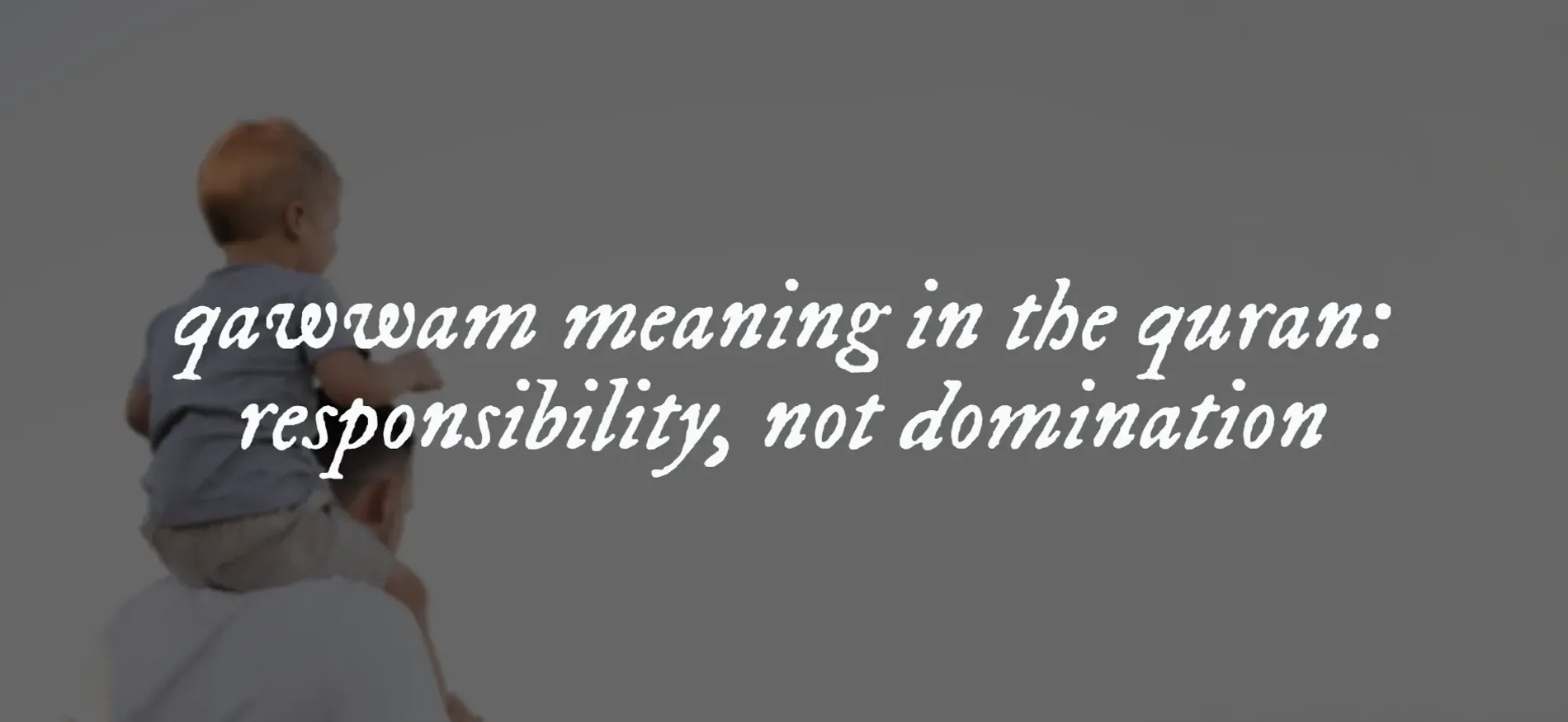Qawwam Meaning in the Quran: Responsibility, Not Domination

In Surah An-Nisa (4:34), Allah says:
ٱلرِّجَالُ قَوَّٰمُونَ عَلَى ٱلنِّسَآءِ
“Men are the caretakers of women.”
The Arabic term قَوَّٰمُونَ (qawwam) is often translated as caretakers, reflecting responsibility, protection, and support. However, in many Indonesian translations, it’s rendered as leaders, which shifts the nuance toward authority and control. This mistranslation has played a role in reinforcing patriarchal norms. Casting women as subordinate, rather than as equal partners with different, but complementary, roles.
Recently, I tuned into a powerful discussion hosted by @themuslimgaze on X. The conversation dove deep into the real meaning and implications of qawwam in the Qur’anic context. Here’s a breakdown of the key takeaways:
Being Active and Responsible
The word qawwam stems from ﻗَﺎﻡَ (qaama), meaning to stand. In classical Arabic, it’s tied to activity, action, and being upright. In a family context, this means the man is expected to be constantly active. Providing, supporting, and protecting.
Being qawwam isn’t about commanding authority, it’s about showing up consistently:
-
Financial provision is his duty.
-
He can’t outsource this responsibility to his wife.
-
Even if she chooses to work, her income is not obligatory.
The Prophet Muhammad ﷺ set the perfect example. He was involved in household chores, fixed his own sandals, helped his wives, and was emotionally present. A qawwam is not just a breadwinner; he’s an engaged partner, a nurturing father, and a pillar in the home.
Meeting the Family’s Basic Needs
A qawwam must ensure the family’s essential needs are met. Food, shelter, clothing, and emotional security. And this must come from his own earnings. Regardless of his wife’s financial status, the man’s duty remains unchanged.
Even if she earns more, it doesn’t lighten his load. Being a provider isn’t about wealth; it’s about fulfilling the divine trust placed on him.
Taking Initiative and Showing Up
The qawwam is not passive. He actively manages and supports the women under his care. His wife, daughters, mother, or sisters. He is their advocate, not their boss.
If a woman in his family is in distress, it’s his role to step in, shield her, and ensure her physical, emotional, and spiritual needs are met.
A Righteous Balance
Righteousness is often defined as “placing things in their rightful place”. This ties into Quran 25:67, where Allah describes the righteous:
وَٱلَّذِينَ إِذَآ أَنفَقُوا۟ لَمْ يُسْرِفُوا۟ وَلَمْ يَقْتُرُوا۟ وَكَانَ بَيْنَ ذَٰلِكَ قَوَامًۭا
“They are those who spend neither extravagantly nor stingily, but are moderate in between.”
A qawwam practices this moderation:
-
He is generous without being wasteful.
-
He provides without falling into stinginess.
-
He balances provision with wisdom.
His financial leadership reflects justice and care, not excess or neglect.
A Pillar in the Storm
Imagine a house without a roof, it might survive. But without a pillar, it collapses. A qawwam is that central pillar.
When challenges arise, the man must be the last to give up. He stands firm, offers stability, and continues to protect and serve, even when things get tough. His strength is not in control, but in endurance.
Consistency is Key
A qawwam embodies اِسْتِقَامَة (istiqamah), steadfastness in thoughts, words, and actions. He is trustworthy, not fickle. His character is aligned, and he follows through on his commitments.
This internal consistency builds respect. A man cannot demand trust while living a double standard. A qawwam earns his place not through authority, but through integrity.
He Adds Value
The word qawwam is etymologically linked to قِيْمَة (qimah)—value. A qawwam should uplift the women in his life, not burden them.
If his presence causes stress, fear, or emotional damage, he is failing in his role. A true qawwam brings value, makes others feel valued, and reflects the values taught by the Prophet ﷺ.
Leadership Through Responsibility, Not Control
There’s a popular analogy: if the family is a school, the mother is the teacher, and the father is the قَيِّم (qayyim) (headmaster)—a word with similar root letters to qawwam.
But what does a headmaster do?
- He sets direction.
- He manages with wisdom.
- He protects the school’s vision.
- He leads through service.
Final Thoughts
To be a qawwam is to embody strength through service, leadership through care, and responsibility through love. It’s not about being “the boss.” It’s about being the rock your family can rely on.
Islam doesn’t place men above women. It assigns roles based on capacity and responsibility. When men fulfill the role of qawwam with sincerity, families thrive. When the term is twisted into dominance, everyone loses.
If you found this helpful, share it with someone who needs a reminder of what true Islamic leadership looks like. Let’s reshape our understanding one word at a time.

